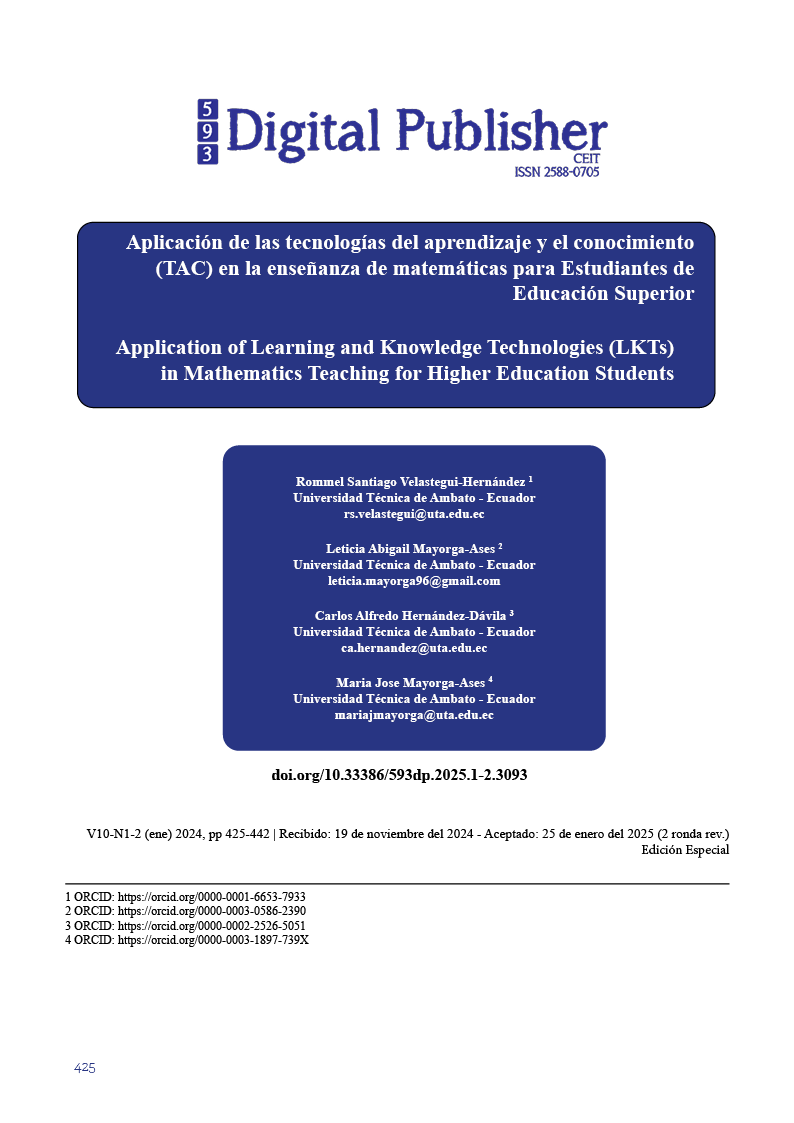Application of Learning and Knowledge Technologies (LKTs) in Mathematics Teaching for Higher Education Students
Main Article Content
Abstract
This study addresses the application of Learning and Knowledge Technologies (LKTs) in mathematics teaching in higher education, assessing both the benefits and challenges associated with their integration. ICT, as interactive tools and digital resources, have been shown to have a positive impact on the understanding of complex mathematical concepts, enabling dynamic visualisation and promoting students' autonomous learning. However, the effective implementation of these technologies faces barriers related to insufficient teacher training, lack of adequate infrastructure and the reluctance of some educators to adopt them. Despite these difficulties, teachers and students recognise the pedagogical benefits of ICT, especially in terms of improved understanding, motivation and personalisation of learning. The study also reveals that, although the technologies enable students to access complementary resources and collaborate more efficiently, some face adaptation challenges due to their limited familiarity with technological tools. It therefore highlights the importance of providing continuous training for teachers and students, and ensuring adequate technological infrastructure to facilitate access to and effective use of ICT. Finally, it is concluded that, despite the challenges, ICTs have the potential to positively transform mathematics teaching, favouring more dynamic and accessible learning.
Downloads
Article Details

This work is licensed under a Creative Commons Attribution-NonCommercial-ShareAlike 4.0 International License.
1. Derechos de autor
Las obras que se publican en 593 Digital Publisher CEIT están sujetas a los siguientes términos:
1.1. 593 Digital Publisher CEIT, conserva los derechos patrimoniales (copyright) de las obras publicadas, favorece y permite la reutilización de las mismas bajo la licencia Licencia Creative Commons 4.0 de Reconocimiento-NoComercial-CompartirIgual 4.0, por lo cual se pueden copiar, usar, difundir, transmitir y exponer públicamente, siempre que:
1.1.a. Se cite la autoría y fuente original de su publicación (revista, editorial, URL).
1.1.b. No se usen para fines comerciales u onerosos.
1.1.c. Se mencione la existencia y especificaciones de esta licencia de uso.
References
Abd-Alrazaq, A., AlSaad, R., Alhuwail, D., Ahmed, A., Healy, P. M., Latifi, S., Aziz, S., Damseh, R., Alrazak, S. A., & Sheikh, J. (2023). Large Language Models in Medical Education: Opportunities, Challenges, and Future Directions. JMIR Medical Education, 9, e48291. https://doi.org/10.2196/48291
Abril-Martínez, C. A. (2020). Malestar docente y violencia escolar una relación por definir: revisión documental de la década del noventa a la actualidad. Revista Logos Ciencia & Tecnología, 12(1), 188–202. https://doi.org/10.22335/RLCT.V12I1.1045
Alshamrani, M. (2022). IoT and artificial intelligence implementations for remote healthcare monitoring systems: A survey. Journal of King Saud University - Computer and Information Sciences, 34(8), 4687–4701. https://doi.org/10.1016/j.jksuci.2021.06.005
Andrade-Vargas, L., Rivera-Rogel, D., Torres-Díaz, J. C., & Beltrán-Flandoli, A. M. (2024). Implications of Internet Use in Higher Education: Academic Plagiarism in College Students[Implicaciones del uso de Internet en Educación Superior: Plagio Académico en Estudiantes Universitarios]. RISTI - Revista Iberica de Sistemas e Tecnologias de Informacao, 2024(E65), 647–660.
Bernate, J. A., & Fonseca, I. P. (2023). Impacto de las Tecnologías de Información y Comunicación en la educación del siglo XXI: revisión bibliométrica. Revista de Ciencias Sociales, ISSN-e 1315-9518, Vol. 29, No. 1, 2023, Págs. 227-242, 29(1), 227–242. https://dialnet.unirioja.es/servlet/articulo?codigo=8822438&info=resumen&idioma=ENG
Chiu, T. K. F. (2024). The impact of Generative AI (GenAI) on practices, policies and research direction in education: a case of ChatGPT and Midjourney. Interactive Learning Environments, 32(10), 6187–6203. https://doi.org/10.1080/10494820.2023.2253861
Collado-Ruano, J., Ojeda, M. N., Malo, M. O., & Amino, D. S. (2020). Education, arts and interculturality: Documentary cinema as a communicative language and innovative technology for learning the R+D+I methodology[Educación, artes e interculturalidad: El cine documental como lenguaje comunicativo y tecnología innovadora para el aprendizaje de la metodología I+D+I][Educação, artes e interculturalidade: O cinema documentário como linguagem comunicacional e tecnologia inovadora para a aprendizagem da metodologia P+D+I]. Texto Livre, 13(3), 376–393. https://doi.org/10.35699/1983-3652.2020.25639
Cuquerella-Gilabert, M., & García, A. M. (2023). Adicciones a las tecnologías de la información y la comunicación en la Comunitat Valenciana, 2018-2020. Gaceta Sanitaria, 37, 102252. https://doi.org/10.1016/J.GACETA.2022.102252
Dong, Y., Li, Y., Zheng, H., Wang, R., & Xu, M. (2022). A new dynamic model and transfer learning based intelligent fault diagnosis framework for rolling element bearings race faults: Solving the small sample problem. ISA Transactions, 121, 327–348. https://doi.org/10.1016/j.isatra.2021.03.042
Dwivedi, Y. K., Kshetri, N., Hughes, L., Slade, E. L., Jeyaraj, A., Kar, A. K., Baabdullah, A. M., Koohang, A., Raghavan, V., Ahuja, M., Albanna, H., Albashrawi, M. A., Al-Busaidi, A. S., Balakrishnan, J., Barlette, Y., Basu, S., Bose, I., Brooks, L., Buhalis, D., … Wright, R. (2023). “So what if ChatGPT wrote it?” Multidisciplinary perspectives on opportunities, challenges and implications of generative conversational AI for research, practice and policy. International Journal of Information Management, 71, 102642. https://doi.org/10.1016/j.ijinfomgt.2023.102642
Fergus, S., Botha, M., & Ostovar, M. (2023). Evaluating Academic Answers Generated Using ChatGPT. Journal of Chemical Education, 100(4), 1672–1675. https://doi.org/10.1021/acs.jchemed.3c00087
Firouzi, F., Farahani, B., & Marinšek, A. (2022). The convergence and interplay of edge, fog, and cloud in the AI-driven Internet of Things (IoT). Information Systems, 107, 101840. https://doi.org/10.1016/j.is.2021.101840
Flores, V., & Yánez, R. (2014). Influencia de la atención sostenida en la lectura comprensiva en los niños y niñas de ocho años de edad del Centro de Educación General Básica “La Providencia” en la Ciudad de Ambato. Revista Científica y Tecnológica UPSE, 2(2). https://doi.org/10.26423/RCTU.V2I2.40
Frenk, J., Chen, L. C., Chandran, L., Groff, E. O. H., King, R., Meleis, A., & Fineberg, H. V. (2022). Challenges and opportunities for educating health professionals after the COVID-19 pandemic. The Lancet, 400(10362), 1539–1556. https://doi.org/10.1016/S0140-6736(22)02092-X
Guerrero, L. K. S., Sandoval, J. A. D., & Álvarez, J. M. G. (2022). Bases pedagógicas en la formación del docente de Educación Superior Técnico-Tecnológica en el Ecuador. Revista Conecta Libertad ISSN 2661-6904, 6(3), 14–28. https://revistaitsl.itslibertad.edu.ec/index.php/ITSL/article/view/307/485
Harrer, S. (2023). Attention is not all you need: the complicated case of ethically using large language models in healthcare and medicine. EBioMedicine, 90, 104512. https://doi.org/10.1016/j.ebiom.2023.104512
Javier, P., Guamán, S., Pastora, M., Sánchez, G., Virginia, ;, Suarez Guamán, J., & Pastora, K. (2017). La educación superior en el Ecuador Vs Las nuevas tecnologías. RECIMUNDO, 1(5), 484–496. https://doi.org/10.26820/RECIMUNDO/1.5.2017.484-496
Khetani, V., Gandhi, Y., Bhattacharya, S., Ajani, S. N., & Limkar, S. (2023). Cross-Domain Analysis of ML and DL: Evaluating their Impact in Diverse Domains. International Journal of Intelligent Systems and Applications in Engineering, 11(7s), 253–262.
Kim, J., Lee, H., & Cho, Y. H. (2022). Learning design to support student-AI collaboration: perspectives of leading teachers for AI in education. Education and Information Technologies, 27(5), 6069–6104. https://doi.org/10.1007/s10639-021-10831-6
Kokol, P., Kokol, M., & Zagoranski, S. (2022). Machine learning on small size samples: A synthetic knowledge synthesis. Science Progress, 105(1). https://doi.org/10.1177/00368504211029777
Kreuzberger, D., Kuhl, N., & Hirschl, S. (2023). Machine Learning Operations (MLOps): Overview, Definition, and Architecture. IEEE Access, 11, 31866–31879. https://doi.org/10.1109/ACCESS.2023.3262138
Li, L. (2024). Reskilling and Upskilling the Future-ready Workforce for Industry 4.0 and Beyond. Information Systems Frontiers, 26(5), 1697–1712. https://doi.org/10.1007/s10796-022-10308-y
Luo, X., Chen, H. H., & Guo, Q. (2022). Semantic Communications: Overview, Open Issues, and Future Research Directions. IEEE Wireless Communications, 29(1), 210–219. https://doi.org/10.1109/MWC.101.2100269
Markauskaite, L., Marrone, R., Poquet, O., Knight, S., Martinez-Maldonado, R., Howard, S., Tondeur, J., De Laat, M., Buckingham Shum, S., Gašević, D., & Siemens, G. (2022). Rethinking the entwinement between artificial intelligence and human learning: What capabilities do learners need for a world with AI? Computers and Education: Artificial Intelligence, 3, 100056. https://doi.org/10.1016/j.caeai.2022.100056
Núñez-Canal, M., de Obesso, M. de las M., & Pérez-Rivero, C. A. (2022). New challenges in higher education: A study of the digital competence of educators in Covid times. Technological Forecasting and Social Change, 174, 121270. https://doi.org/10.1016/j.techfore.2021.121270
Park, H., Otte, A., & Park, K. (2022). Evolution of drug delivery systems: From 1950 to 2020 and beyond. Journal of Controlled Release, 342, 53–65. https://doi.org/10.1016/j.jconrel.2021.12.030
Pasquale, V. Di, Simone, V. De, Miranda, S., & Riemma, S. (2022). Operadores inteligentes: Cómo las tecnologías aumentadas y virtuales están afectando al trabajador’s rendimiento en contextos de fabricación. Journal of Industrial Engineering and Management, 15(2), 233–255. https://doi.org/10.3926/jiem.3607
Pirayesh, H., & Zeng, H. (2022). Jamming Attacks and Anti-Jamming Strategies in Wireless Networks: A Comprehensive Survey. IEEE Communications Surveys and Tutorials, 24(2), 767–809. https://doi.org/10.1109/COMST.2022.3159185
Rojas-Sánchez, M. A., Palos-Sánchez, P. R., & Folgado-Fernández, J. A. (2023). Systematic literature review and bibliometric analysis on virtual reality and education. Education and Information Technologies, 28(1), 155–192. https://doi.org/10.1007/s10639-022-11167-5
Roumeliotis, K. I., & Tselikas, N. D. (2023). ChatGPT and Open-AI Models: A Preliminary Review. Future Internet, 15(6), 192. https://doi.org/10.3390/fi15060192
Santiago Velastegui-Hernández, R., Tagua-Moyolema, A. E., Cumandá, X., -López, M., & Germán Muyulema-Muyulema, D. (2024). Análisis de la relación entre el uso de tecnologías educativas y el rendimiento académico de los estudiantes universitarios. 593 Digital Publisher CEIT, 9(4–1), 184–195. https://doi.org/10.33386/593dp.2024.4-1.2738
Song, Y., Wang, T., Cai, P., Mondal, S. K., & Sahoo, J. P. (2023). A Comprehensive Survey of Few-shot Learning: Evolution, Applications, Challenges, and Opportunities. ACM Computing Surveys, 55(13s), 271. https://doi.org/10.1145/3582688
Sun, W., & Huang, C. (2022). Predictions of carbon emission intensity based on factor analysis and an improved extreme learning machine from the perspective of carbon emission efficiency. Journal of Cleaner Production, 338, 130414. https://doi.org/10.1016/j.jclepro.2022.130414
Tapalova, O., & Zhiyenbayeva, N. (2022). Artificial Intelligence in Education: AIEd for Personalised Learning Pathways. Electronic Journal of E-Learning, 20(5), 639–653. https://doi.org/10.34190/ejel.20.5.2597
Thurzo, A., Strunga, M., Urban, R., Surovková, J., & Afrashtehfar, K. I. (2023). Impact of Artificial Intelligence on Dental Education: A Review and Guide for Curriculum Update. Education Sciences, 13(2), 150. https://doi.org/10.3390/educsci13020150
Wang, M., Yu, H., Bell, Z., & Chu, X. (2022). Constructing an Edu-Metaverse Ecosystem: A New and Innovative Framework. IEEE Transactions on Learning Technologies, 15(6), 685–696. https://doi.org/10.1109/TLT.2022.3210828
Yang, W. (2022). Artificial Intelligence education for young children: Why, what, and how in curriculum design and implementation. Computers and Education: Artificial Intelligence, 3, 100061. https://doi.org/10.1016/j.caeai.2022.100061
Ysela, S., Larreategui, C., Mercedes, E., Yalta,





